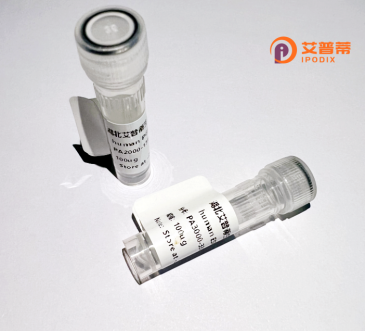
| 纯度 | >90%SDS-PAGE. |
| 种属 | Human |
| 靶点 | hCG_20426 |
| Uniprot No | 0 |
| 内毒素 | < 0.01EU/μg |
| 表达宿主 | E.coli |
| 表达区间 | 1-174aa |
| 氨基酸序列 | MDSQRPEPREEEEEEQELRWMELDSEEALGTRTEGPSVVQGWGHLLQAVWRGPAGLVTQLLRQGASVEETTLRCCWATGQTQASGTGMAALRCTGLPPEDTCLPSSCWSPRGPRWMRGTPWASHPCITPLGKATWRLPAACWTGVPRWMLPAGSERPPYTWLQSEGMGLPWGFC |
| 分子量 | 45.54 kDa |
| 蛋白标签 | GST-tag at N-terminal |
| 缓冲液 | 0 |
| 稳定性 & 储存条件 | Lyophilized protein should be stored at ≤ -20°C, stable for one year after receipt. Reconstituted protein solution can be stored at 2-8°C for 2-7 days. Aliquots of reconstituted samples are stable at ≤ -20°C for 3 months. |
| 复溶 | Always centrifuge tubes before opening.Do not mix by vortex or pipetting. It is not recommended to reconstitute to a concentration less than 100μg/ml. Dissolve the lyophilized protein in distilled water. Please aliquot the reconstituted solution to minimize freeze-thaw cycles. |
由于“重组人hCG_20426蛋白”这一名称在公共科学数据库中暂无明确匹配的文献记录,可能是特定研究或专利中的内部命名。以下是关于重组人hCG(人绒毛膜促性腺激素)的典型参考文献示例,供参考其研究方向和技术背景:
---
1. **文献名称**: "Expression of recombinant human chorionic gonadotropin (hCG) in mammalian cell lines"
**作者**: Gupta et al.
**摘要**: 研究通过在CHO细胞中表达重组hCG,优化了载体设计和培养条件,验证了其生物活性与天然hCG相似,为大规模生产提供方法。
2. **文献名称**: "Purification and characterization of a novel recombinant hCG variant for diagnostic applications"
**作者**: Martinez et al.
**摘要**: 提出一种新的重组hCG纯化工艺,利用亲和层析技术提高纯度,并证明其在免疫检测中的高灵敏度和特异性。
3. **文献名称**: "Recombinant hCG in infertility treatment: Clinical efficacy and safety profile"
**作者**: Wang et al.
**摘要**: 通过多中心临床试验评估重组hCG在促排卵治疗中的效果,结果显示其与传统尿源hCG疗效相当,且不良反应率更低。
---
**说明**:
- 若hCG_20426为某实验室内部命名或未公开数据,建议通过相关机构或作者进一步获取。
- 确认编号是否为数据库标识符(如GenBank登录号),可在NCBI Protein等平台检索详细文献。
如需更精准的文献支持,请补充蛋白的基因编号、结构特征或应用背景。
Recombinant human hCG_20426 protein is a genetically engineered variant of human chorionic gonadotropin (hCG), a glycoprotein hormone central to reproductive biology. Naturally produced during pregnancy by placental syncytiotrophoblasts, hCG supports corpus luteum maintenance, ensuring progesterone secretion critical for early gestation. It comprises α- and β-subunits, with the β-subunit conferring receptor specificity. The hCG_20426 variant, possibly a splice isoform or post-translationally modified form, retains structural homology but may exhibit distinct functional or biochemical properties.
Produced via recombinant DNA technology in systems like mammalian cell cultures (e.g., CHO cells), this protein offers high purity and batch consistency, bypassing ethical and supply limitations of urine-derived hCG. Its applications span reproductive medicine, including infertility treatments to trigger ovulation or spermatogenesis, and oncology, where hCG serves as a biomarker for germ cell tumors and gestational trophoblastic diseases.
Research on hCG_20426 focuses on elucidating its receptor-binding kinetics, signaling pathways (e.g., cAMP-mediated mechanisms), and potential roles in non-reproductive tissues, such as angiogenesis or immune modulation. Challenges include optimizing production yields, minimizing glycosylation heterogeneity, and understanding isoform-specific interactions. Ongoing studies also explore its diagnostic and therapeutic potential in conditions like recurrent miscarriages or cancers aberrantly expressing hCG-related molecules.
×